By ANI FREEDMAN, InDepthNH.org
CONCORD – After hearing testimony from youth climate activists on Tuesday for a House Resolution to expand climate change education, the House Education Committee convened for its executive session on Wednesday to discuss their recommendation on the bill. Not only were they divided in whether or not they believed the resolution should pass, but they also revealed their own conflicting perspectives on the urgency of the climate crisis.
Rep. Hope Damon, D-Sunapee, applauded the students who testified the day before—and was shocked that her colleagues weren’t in agreement with passing the resolution. The bill, HR30, encourages the state to build a more robust climate change curriculum that includes a “balanced history” on renewable energy, fossil fuels, and pollution, socioeconomic impacts of climate change, and actionable solutions to mitigating the climate crisis.
“I find it sad that there wouldn’t be more unanimity on this topic,” Damon said. “There’s no cost to this bill, it’s about starting better conversations on this.”
Since HR30 is a resolution and not a law, no curriculum changes would be made if it were passed by the legislature. Instead, as Rep. Mel Myler, D-Contoocook, explained, passing HR30 would signify, “This is what we think as a body.”
But even though the passage would not yet put into action any changes to public education, the Education Committee was split on its implications.
Rep. Mike Belcher, R-Wakefield, was quick to motion against the bill, citing concerns over how greater climate education could impact students mentally.
“I don’t think we should be inducing climate anxiety in students by putting more of this on them,” Belcher said. “If this is a real problem, it’s an adult problem to be dealt with.”
Damon countered Belcher’s point about anxiety in her support for the resolution.
“Pretending that climate change isn’t happening is not going to decrease their anxiety,” Damon said. “You don’t get rid of anxiety by saying, ‘Oh no, it’s nothing to worry about, the adults will take care of it.’”
See related story here: https://indepthnh.org/2024/03/05/teen-activists-seek-robust-climate-change-education-in-nhs-public-schools/
As the committee’s discussion unfolded, legislators expressed their disagreement with one of the resolution’s key curriculum components:
“An acknowledgment that human activities have caused a crisis we are working to solve today.”
Multiple committee members voiced that they have reason to believe this statement is untrue, citing debate among scientists about the extent to which humans have had an impact on the changing climate.
“Not everyone believes this,” said Rep. Arlene Quaratiello, R-Atkinson. She said that the children’s testimony supporting this claim was “Partially caused by the promulgation by things I just don’t agree with.”
Rep. Alicia Lekas, R-Hudson, seconded Quaratiello’s point. “To start from a scientific point of view of which there is difference on I think is wrong,” Lekas said.
“I think it would be great for kids to learn, but they should be learning about what different scientists say,” Lekas continued. “They should be looking at both sides.”
Several of the Democratic representatives directed the conversation back to the children who testified, while conveying their own convictions in climate change.
Rep. Corinne Cascadden, D-Berlin, said she felt the committee was “overthinking” the resolution, especially considering that voting to pass it would not mandate any curriculum changes.
“We’re not giving them permission to change anything. We’re giving them validation for what they believe is occurring, and they will continue to study it,” Cascadden said. “Anything kids could do far surpasses what adults could do.”
Other representatives, including Rep. Stephen Woodcock, D-Center Conway, and Rep. David Luneau, D-Hopkinton, spoke firmly about the fact that climate change is happening, and they could all see it—in their own hometowns and around the globe.
“The change of climate around this country and the world is there, there’s no question about that,” said Rep. Myler. “And it would seem to me that it’s important for this House to make a statement about that.”
Both Myler and Woodcock acknowledged that people their age, such as the other committee members, are of the generation that has caused climate change.
“The point is they know this is happening, and they want to know why it’s happening,” Myler said.
“Perhaps as a result of that increased knowledge base, they might save this planet,” Myler added. “I sure as hell am too old to save it right now.”
The committee tied in both of its votes to recommend the resolution passes or fails, voting along party lines. It will now move to the House floor for a full vote. If passed, there will be no curriculum changes or mandates to amplify climate change education.
Ani Freedman is a contract reporter with InDepthNH.org. She is a recent graduate from Columbia Journalism School with a passion for environmental, health, and accountability reporting. In her free time, she’s an avid runner and run coach. She can be reached at anifreedmanpress@gmail.com.





